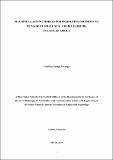| dc.description.abstract | In dairy, lack of decision support tools for identifying farmers' needs and demands have caused
many programs, strategies, and projects to fail. This has led to the inefficient and fragmented
allocation of scarce development resources. This study demonstrated how machine learning
(ML) can be used as a tool to bridge this gap; by developing ML models to be used in
identifying factors that can influence farmers decisions, predicting decision to be made by a
farmer and forecast on farmers demands regarding to their specific need or service. Four
countries: Ethiopia, Kenya, Tanzania and Uganda were selected for this study.
In the course of the study four models were developed one for each country with regard to
the usage of animal supplements, keeping of exotic animals, use of Artificial insemination (AI)
as breeding methods and animal milk productivity. Data was collected through face to face
interviews, from a total of 16 308 small scale dairy farmers in Ethiopia (n = 4679), Kenya (n =
5278), Tanzania (3500) and Uganda (n = 2851). The decision tree algorithm was used to model
categorical problems (use of supplement and breeding decision), which attained the accuracy
of 78%-90%. Moreover, K-nearest neighbor was employed for numeric problems (keeping of
exotic animals and animal milk productivity) with an accuracy of 0.78-0.96 Adjusted R
The use of ML techniques assisted in classifying farmers based on their characteristics and it
was possible to identify the key factors that can be taken then prioritized to improve the dairy
sector among countries. Also, the results of this study offer a number of practical implications
for the dairy industry where the proposed ML models can enable decision-makers in
developing the National Dairy Master Plan and design policies that promote the growth of
smallholder dairy farming. Moreover, these models shade light to potential service providers
and investors who want to invest in dairy to identify potential areas or groups of farmers to
focus with.
2
value. | en_US |


